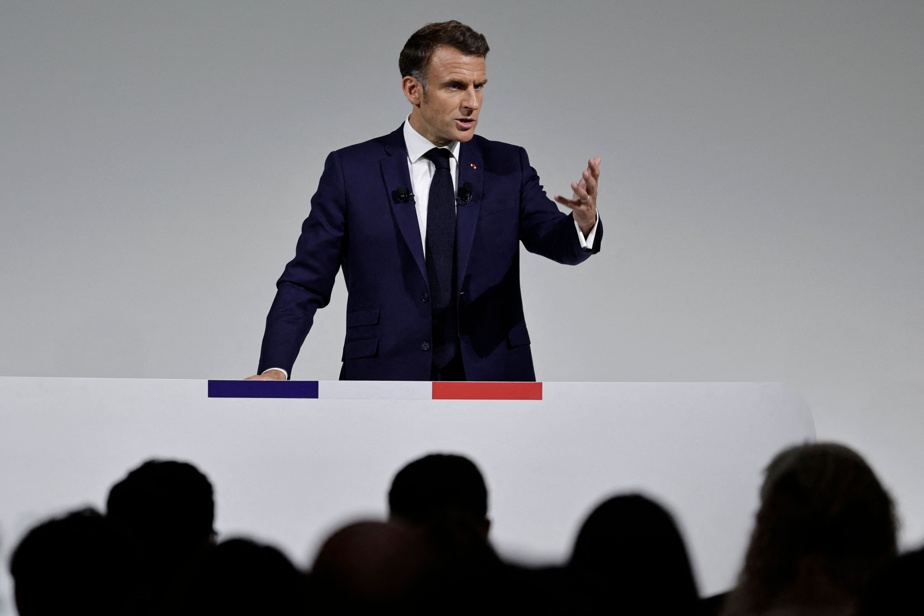(Paris) Criticized for having dissolved the National Assembly after the debacle of his camp in the European elections, French President Emmanuel Macron defended on Wednesday a choice of “clarification” and called for a “start” in the face of the far right, in a position by force before the legislative elections, and the extreme left.
For the first time, the French head of state also admitted his “responsibility” for the failure of his camp, defeated by the Europeans on Sunday by the far-right National Rally (RN) party, while refusing “the spirit of defeat” and defending himself from wanting to “give the keys to power to the extreme right”.
Throughout a press conference lasting more than an hour and a half, the president worked Wednesday to justify his decision to dissolve the Assembly, which plunged the country into uncertainty, surprised in his own camp and implodes the Republican right around a possible alliance with the RN.
“I fully take responsibility for having triggered a movement of clarification. Firstly because the French asked us for it on Sunday. When 50% of French people vote at the extremes, when you have a relative majority in the Assembly, you cannot tell them: “We continue as if nothing had happened,” he declared.
Despite his popularity at half mast and the polls which make the RN the big favorite in the elections of June 30 and July 7, Emmanuel Macron called on the parties of his majority to begin discussions with other political groups which will have “been able to say no to the extremes” in order to “build a sincere and useful common project for the country” and “govern”.
Outlining some programmatic measures (major debate on secularism, telephone ban for children under 11, etc.), the president above all sent back to back the extreme right, which would advocate “exclusion”, and the extreme left embodied by La France insoumise (LFI), which he accuses of “anti-Semitism and anti-parliamentarism”.
“I say the extreme right when speaking of the National Rally, because its leaders continue to say that there are real and false French people, continue to consider reducing press freedom or rejecting the State of right,” he said, emphasizing the dangers of the RN coming to power, which totaled 31.37% of the votes at the polls on Sunday in France.
“If the National Rally came to power, what would happen to our values, to our dual-national compatriots of diverse origins living in the neighborhoods?” he notably asked, also accusing the RN of maintaining an “ambiguity with regard to Russia” on Ukraine and of wanting “to leave NATO.”
“The markets are panicking, international European partners are worried,” he also argued.
Mr Macron also targeted the radical left party La France insoumise (LFI), which he accused of having “created sometimes constant” and “worrying” disorder in the National Assembly, and castigated the alliance “ indecent” which is emerging between this formation and other left-wing parties despite the “gap” which separates them on aid to Ukraine or the status of the Palestinian movement Hamas.
Despite these differences, the construction of this new “Popular Front” is taking shape on the left with an agreement concluded very late in the night from Tuesday to Wednesday to distribute almost all of the 577 constituencies in view of the next legislative elections.
On the right, the confusion is much greater. The unprecedented call on Tuesday from the leader of the Republicans (LR, right) Eric Ciotti to ally with the National Rally imploded the party heir to General de Gaulle and created a psychodrama. An exceptional party office was to meet in the afternoon to decide on the possible exclusion of its leader, in his absence.
Eric Ciotti “will no longer be president of the Republicans […] he will be dismissed,” said LR senator from Paris Agnès Evren on Wednesday morning.
Delighted with his war prize, the leading figure of the RN Marine Le Pen praised Eric Ciotti’s “courageous choice” and “sense of responsibility”. The party also welcomed a new survey published Tuesday which credits it with 35% voting intentions in the first round of the legislative elections.
In the majority, the debate is also growing on the place that Emmanuel Macron should play in the campaign, with certain deputies and executives fearing a sanction vote linked to the rejection of the president by part of the public.
His former prime minister Édouard Philippe thus judged it “not completely healthy” for the president to get too involved, pointing out in passing an “anger” aroused, according to him, in public opinion by the dissolution.
“The President of the Republic must set a course, a vision, but he is not there to campaign in the legislative elections. So I will not campaign in the legislative elections,” replied Mr. Macron.




